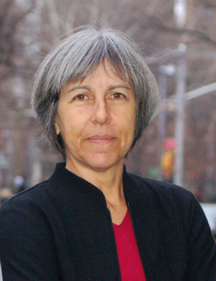By Kathleen Lamanna
Professor Bambi B. Schieffelin, a linguistic anthropologist from New York University, visited Wells College this fall, October 27-28. Wells College, home of the Xi of New York Chapter, brought Schieffelin to campus for a Phi Beta Kappa Visiting Scholar Lecture entitled “Language and Intentionality: Whose Mind Are You Speaking?”
The lecture, which was held in the E. Margie Matthews Filter Hostetter ’62 Lecture Room in the college’s Stratton Hall, focused on contrasting the language practices of the Bosavi people in Papua New Guinea with communication styles among New York City college students that took place over computer-mediated outlets, namely Instant Messaging.
Schieffelin’s talk showcased the diversity that Instant Messaging communications had in relation to quoting one’s own and other’s thoughts through the use of the relatively new quotative format, “I was like”… This was contrasted in Schieffelin’s lecture by her research in the small, mono-lingual community of Bosavi, Papua New Guinea, where speakers never verbally speculated about what was in other people’s minds.
Schieffelin graduated from Columbia University in 1967 with a Bachelors of Science degree in Anthropology and Comparative Literature. Describing her first experience with anthropology, Schieffelin explained: “I spoke Spanish, and that gave me the opportunity to go on a summer field trip to Bolivia after my junior year of college. I think that’s when I really decided anthropology was for me.” Upon graduation, Schieffelin went to New Guinea, then returned to Columbia University where she earned a Masters in Arts in Developmental Psychology in 1977 and Doctor of Philosophy in Anthropology in 1979.
From 1979 to 1980 Schieffelin held a post-doctoral fellowship in Developmental Psychology as the University of California, Berkeley, where she wrote her doctoral dissertation. Her first regular teaching job was at the University of Pennsylvania, from 1980 to 1986. Since 1986, she has been teaching Anthropology at New York University, where she has been able to work with the material that she collected in New Guinea over several decades. She is currently Collegiate Professor and Professor of Anthropology at New York University.
Schieffelin’s main area of research revolves around the way that linguistics and cultural practices are spliced together in terms of language and social interactions. “I am very interested in places where literacy and orality are blurred,” said Schieffelin. “I would say a common theme in my work has been what people do with language, what people do to language, how people talk about language. I’ve been able to follow that across a number of different communities of speakers and sites of social change.”
These interests came together in Schieffelin’s visit to Wells, where she was able to talk one on one with students during lunch, dinner, and, of course, class time. Fortunately, I was able to sit down with Professor Schieffelin during her visit to Wells. She expressed sheer passion for her work, as well as the idea of a liberal arts education as a whole.
“I am a really big fan of a liberal arts education,” said Schieffelin. “I really think that you don’t get too many opportunities to really explore all kinds of topics.” Schieffelin stated that “liberal arts educations give you an opportunity to learn how to learn.” She expressed her commitment to the humanities and social sciences, as well as the culture and traditions that go along with a strong liberal arts education, saying, “I don’t see liberal arts as a luxury, I see it is a critical preparation for a kind of creative thinking that is relevant to science, medicine, and everything else.”
Schieffelin’s visit to Wells College was enjoyed by all members of the Wells community.
Kathleen Lamanna is a senior at Wells College majoring in English with a focus in creative writing and a minor in history. Wells College is home to the Xi of New York Chapter of Phi Beta Kappa.




